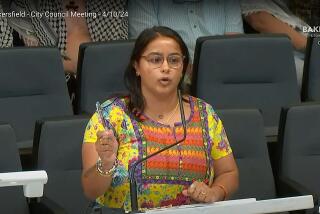In traffic court, confessions come easily
As with most people who land in traffic court, Dae Lee, Denise Milton and Felix Arellanoramirez were defiant.
Lee indeed was impeding traffic, Milton did pass through that stop sign, and it was true that Arellanoramirez was driving without a license, they told the judge.
But, they argued, they still did not deserve a ticket.
In court recently, each made the mistake attorneys and judges say is the most common among those who choose to represent themselves in traffic court -- they admitted their guilt.
When a few hundred dollars in fines are weighed against attorney fees that can exceed $1,000, most people who fight traffic tickets choose to represent themselves in court. The majority, however, show up with little understanding of the law or court proceedings. As a result, traffic trials end up functioning more like therapy, where defendants tell their side of the tale to their heart’s content.
“They want a chance to come tell their story,” said J. Stephen Czuleger, presiding judge of Los Angeles County Superior Court, who recently filled in at traffic court to help reduce a backlog of arraignments. “This is where the rubber meets the road, the average citizen comes into contact with the justice system.”
Most people who receive one of the 1.8 million tickets issued in the county each year plead guilty or no contest. Less than 5% of the cases go to trial, according to Gregory Blair, a senior administrator for the county courts who oversees traffic operations in 27 courthouses.
Recently, steeper fines, stricter regulations for truck drivers and the growing volume of citations issued as a result of traffic cameras have been causing more people to fight their tickets, according to traffic attorneys who have seen an increase in demand for their services.
Of those who ask for a trial, many become intimidated by the prospect of having to argue their case before a judge and decide at the last minute to plead guilty and opt for traffic school instead. A handful win legal victories when the officer who wrote the ticket doesn’t show up, which results in the automatic dismissal of a case.
Those who remain tend to be the most fervent about their cases.
“Sometimes they get emotional. Everybody’s mad about their ticket,” said Czuleger, who listened to the arguments of Lee, Milton, Arellanoramirez and scores of others last month.
The last time Czuleger presided over traffic court was 20 years ago. The stories people tell, he said, haven’t changed a bit in those two decades.
“Eventually a lot of people admit they did it,” he said.
Those familiar with traffic courts say many people concede driving over the speed limit by a couple of miles an hour in an effort to deny going over by 10 or 20 mph. Exceeding the posted limit by any amount is illegal, and such admissions usually result in guilty verdicts, attorneys say. Another faux pas is rambling about circumstances that are irrelevant to the infraction.
“I’m not here to say whether the law is fair or unfair,” Czuleger told the defendants before he started hearing cases. “The only question is whether there has been a violation of the law.”
Thomas P. McGrath, who wrote tickets as a police officer for 10 years but is now a traffic attorney, said some drivers “have a good case, but people don’t present it right because they’re scared to stand up there. They freeze up or something. The police are professional testifiers.”
Lee, accused of making a left turn on a red light and impeding traffic, sketched the intersection of Oxford Avenue and Wilshire Boulevard in Koreatown on a blackboard, trying to show that he had no choice but to block the onslaught of rush-hour traffic on Wilshire.
He knows the intersection well because he works nearby, and would never intentionally do anything illegal, Lee said.
Czuleger was unswayed: “I’m going to find you guilty.”
Milton, who was accused of failing to stop at a stop sign while driving in the Harbor Gateway area, spoke at length about how she was looking at officers who were “just cajoling” at another intersection and totally missed the red hexagon.
“I did pass that stop sign, but I was distracted by the officers,” Milton said, adding that she had no income and was not even able to afford the fees for traffic school.
“You are guilty, but I am going to suspend the fine,” Czuleger said. “I will order you to traffic school.”
Arellanoramirez, cited for making an illegal right turn and driving without a license, repeatedly explained through a Spanish interpreter how he makes that right turn on Vernon Avenue every day to pick up food at his favorite restaurant.
“As for a license, I don’t have one,” he said.
“Is it a good restaurant?” Czuleger asked.
“It’s the only one that’s open 24 hours,” the defendant replied.
“I’m going to find you guilty on both counts,” the judge said.
Critics say traffic courts are focused on generating revenue and discourage people from fighting tickets, nudging them toward pleading guilty and enrolling in traffic school.
“If you go and take up an hour of the court’s time, you’ve eaten up most of the profit of the traffic citation,” said Jim Baxter, president of the National Motorists Assn.
Traffic attorneys say drivers have the best chance of beating a ticket if they go to the scene of the offense and take photos or draw diagrams showing that the officer could not have seen their alleged infractions, then calmly and succinctly present their case in court.
Defendants have the right to cross-examine the officer and subpoena records that show whether the equipment, such as radar guns, was properly calibrated and if studies were done to set an appropriate speed limit.
Of the 19 cases that Czuleger heard that day, in which all the defendants represented themselves, 16 people were found guilty and one was found not guilty when the judge determined that the officer could not have seen the alleged infraction.
One case was dismissed because the officer had written the wrong date of the offense, and another had already been resolved and was listed because of an administrative error.
“The most fun I ever had as a judge was in this building,” Czuleger said. “It’s just basic, rough justice.”
--
More to Read
Start your day right
Sign up for Essential California for news, features and recommendations from the L.A. Times and beyond in your inbox six days a week.
You may occasionally receive promotional content from the Los Angeles Times.







